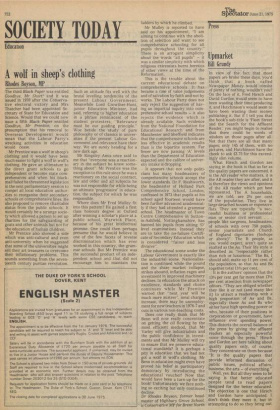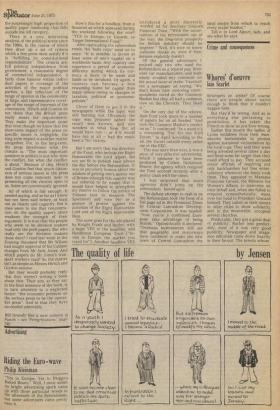Press
Upmarket
Bill Grundy
In view of the fact that most papers are broke these days, you'd think that a book called Newspaper Money would consist of plenty of nothing, wouldn't you? On the face of it, Fred Hirsch and David Gordon would seem to have been wasting their time producing it, and Hutchinson's would seem to have been wasting their money publishing it. But if I tell you that the book's sub-title is 'Fleet Street and the Search for the Affluent Reader,' you might begin to realise that there could be words of wisdom on those pages after all. Not that there are all that many pages; only 145 of them, with no pictures, and Hutchinson have the cheek to ask 0.75 for this exceedingly slim volume.
What Hirsch and Gordon are
saying in the book is that as far as the quality papers are concerned, it is the AB reader who matters, it is the AB reader they are after, and it is therefore the views and opinions of the AB reader which get best represented. The A households, we are told, are 21/2 per cent of the population. They live in large detached houses or expensive flats. They are typically "a successful business or professional man or senior civil servant . . . people like surgeons, headmasters of schools with over 750 pupils, senior journalists and Church of England dignitaries (bishops or above)". The B people, as you would expect, aren't quite as exalted as the As. Their life style is described as "respectable rather than rich or luxurious." The Bs, I should add, make up 11 per cent of the population, so that As and Bs together total 131/2 per cent.
It is the authors' opinion that the 131/2 per cent get far more than 131/2
per cent attention from newspaper editors. "They are obliged whether they like it or not (and many like it) to attract a readership with a high proportion of As and Bs, especially those As and Bs who either have high spending power or who, because of their positions in corporations or government, have influence over spending power. This distorts the overall balance of the press by giving the affluent readers an especially powerful voice through the press." Hirsch and Gordon are here talking about quality papers only, of course. They concentrate on them because "It is the quality papers that provide informed discussion of public issues, political affairs, business, the arts — of everything."
Well, yes. But all they seem to be saying is that better educated' people tend to read papers designed for the better educated. The objection is one that Hirsch and Gordon have anticipated. I. don't think they meet it, but in attempting to do so they bring out the surprisingly high proportion of quality paper readership that falls outside the AB category.
There is a very interesting analysis of the political scene since the 1960s, in the course of which they draw up a set of criteria which a free press must satisfy if it is "fulfilling its constitutional responsibilities". The criteria are: full political independence from government, a reasonable degree of commercial independence, a fairly close balance within individual papers in coverage of the activities of the major political parties, a fair reflection of the range of opinion in the community at large, and representative coverage of the range of interests of the community. Hirsch and Gordon do not think that the British press really meets the requirements. They make the important point that even though we know that the short-term impact of the press on specific issues is negligible, the long-term impact is another matter altogether. For, in the long-term, the press determines what the climate is: "The most important question in politics is not who wins
• the conflict, but what the conflict is about." Because of this, Hirsch and Gordon feel that much discussion of serious issues in the press does not come remotely near to presenting all the choices open to us. Some are conveniently ignored.
All of which is fair enough. It needed saying, and as far as I know has not been said before, at least not as clearly and cogently. But it does seem to me that concentration on the quality papers alone weakens the strength of their argument. It is true that the people who seem to be decision makers read only the posh papers. But who really are the decision makers these days? I read last week in the Evening Standard that Mr Wilson had sought approval of his Cabinet changes from Mr Jack Jones. And which papers do Mr Jones's transport workers read? So the matter isn't as simple as Messrs Hirsch and Gordon assume.
But they would probably reply that they weren't writing a book about that. Their aim, as they say in the final sentence of the book, is to turn attention to a neglected factor: "the economic pressure on the serious press to be the upmarket press". And in that they have succeeded admirably.
Bin Grundy has a new column in Punch — see Peregrinations', page 740



































 Previous page
Previous page